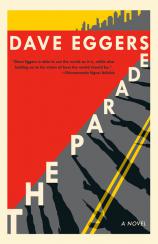The Parade
Review
The Parade
In a career that began nearly two decades ago with the distinctive memoir A HEARTBREAKING WORK OF STAGGERING GENIUS, Dave Eggers’ output of both nonfiction and fiction has been nothing if not eclectic. That quality continues in his latest novel, THE PARADE, whose surface simplicity conceals a complex parable of human relations that embraces life in both its personal and political dimensions.
Set in an unnamed nation whose physical characteristics suggest Africa, THE PARADE focuses on two foreign contractors --- known only to the reader and each other as “Four” and “Nine” --- who have been sent there to execute a road-paving project intended to unite the northern and southern halves of the country, “a nation recovering from years of civil war, riddled with corruption and burdened by a new and lawless government.” Despite “a million displaced, a million in exile, ten thousand orphans,” the country now has awakened to a “rush of foreign aid reconstruction funds, foreigners coming to assess and consult, to hand out grants and bribes and collect fees.”
Four is the ultimate cynical company man, displaying as much humanity as the 34-ton machine known as the RS-90 he’s determined to operate with the focus required to complete 230 kilometers of paving and painting in only 12 days. He must adhere to this strict schedule to allow the project’s completion in time for a parade, “symbolizing an end to decades of war and the beginning of the peace and prosperity the road would make possible.” Eggers’ description of the RS-90 --- “a perfect machine, one that requires little maintenance, that efficiently draws what it needs from the world, executes its work and asks for nothing in return” --- is an apt summing up of Four’s character, one that’s seasoned with more than a dash of Kiplingesque imperialist hauteur.
"THE PARADE shares its lineage with the works of writers like Joseph Conrad and Graham Greene, while evoking the spirit of more contemporary novels like Joan Didion’s A BOOK OF COMMON PRAYER and Robert Stone’s A FLAG FOR SUNRISE."
Nine, his novice co-worker whose job is to precede Four in a small all-terrain vehicle, looking for impediments --- human and otherwise --- in their path, couldn’t be more different. Despite his inexperience, unlike Four, he’s at least able to speak the host country’s language. But Four regards Nine as an “agent of chaos,” someone who abandons his tasks to cavort a bit too intimately with the locals in their villages and in disease-infested waters, inspiring Four on his long days atop the RS-90 to imagine the sacking that will await his colleague when their project is completed.
Though hostilities have ended, conditions in this devastated country, where ragtag gangs of former rebels still roam the land, are anything but benign. At one point, Four has to make his way through a forest pocked with land mines to return a boy who’s delaying the paving project to his village. Mounted on the RS-90, he puzzles over the sight of a large mound of black plastic garbage bags one character describes to him cryptically as the “waste of war.”
Eggers’ somewhat monochromatic story springs to life when Nine disappears and the crisis that incident provokes compels Four to reconsider his paternalistic attitude toward the local population. Forced to rely on a pair of locals he nicknames “Medallion” and “Cousin,” Four must grapple with his responsibilities toward Nine, someone he considers abandoning to a grisly fate, as his co-worker pleads for mercy. In that process, Eggers subtly discloses aspects of Four’s inner life that reveal a man far more complex than the “extension of the machine” he appears to be while laying down kilometer after kilometer of pristine pavement.
It’s not giving anything away to reveal that the paving project eventually reaches its end, in a capital where the “glass high-rises of the city’s waterfront shone gold in the afternoon sun” and that’s “a hundred years ahead of the town from which they’d begun the road.” For all his cynicism, Four finally seems to grudgingly share Nine’s optimism that “the second we’re done, their world catapults into the twenty-first century.” What can’t be revealed is the shocking twist Eggers delivers in the novel’s concluding pages. It’s a gut punch of an ending that’s as disturbing as it is sudden.
With its world-weary protagonist and skepticism about the motives of those bearing the banner of progress to the developing world, THE PARADE shares its lineage with the works of writers like Joseph Conrad and Graham Greene, while evoking the spirit of more contemporary novels like Joan Didion’s A BOOK OF COMMON PRAYER and Robert Stone’s A FLAG FOR SUNRISE. As timely as tomorrow’s headlines, there’s a timelessness to it that somehow transcends them.
Reviewed by Harvey Freedenberg on March 22, 2019
The Parade
- Publication Date: March 17, 2020
- Genres: Fiction
- Paperback: 192 pages
- Publisher: Vintage
- ISBN-10: 0525564675
- ISBN-13: 9780525564676




